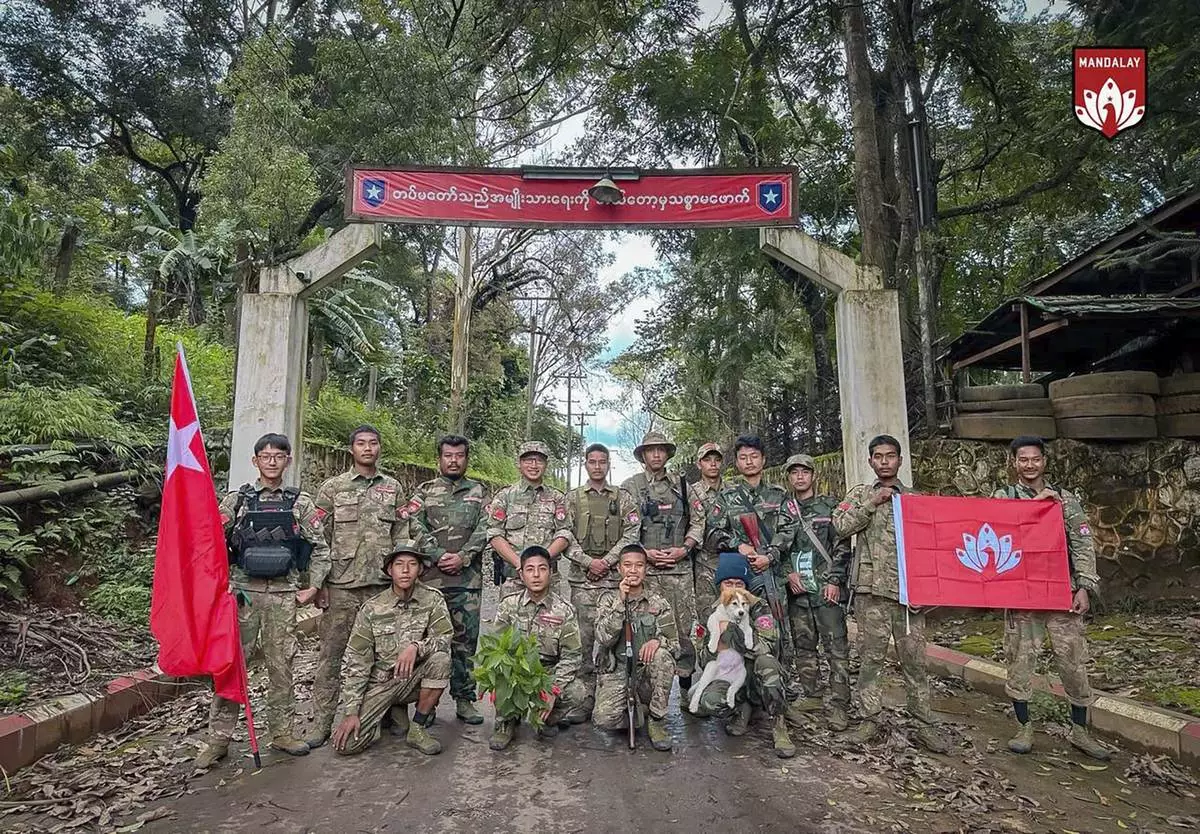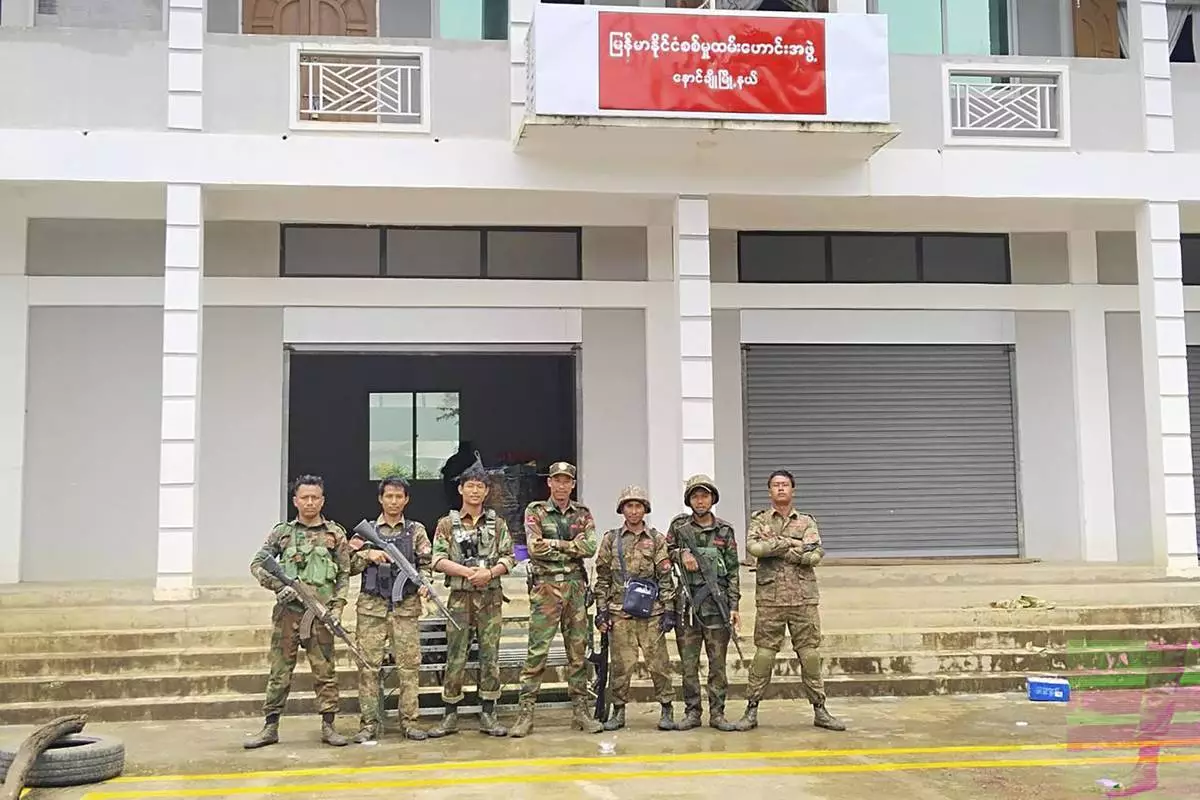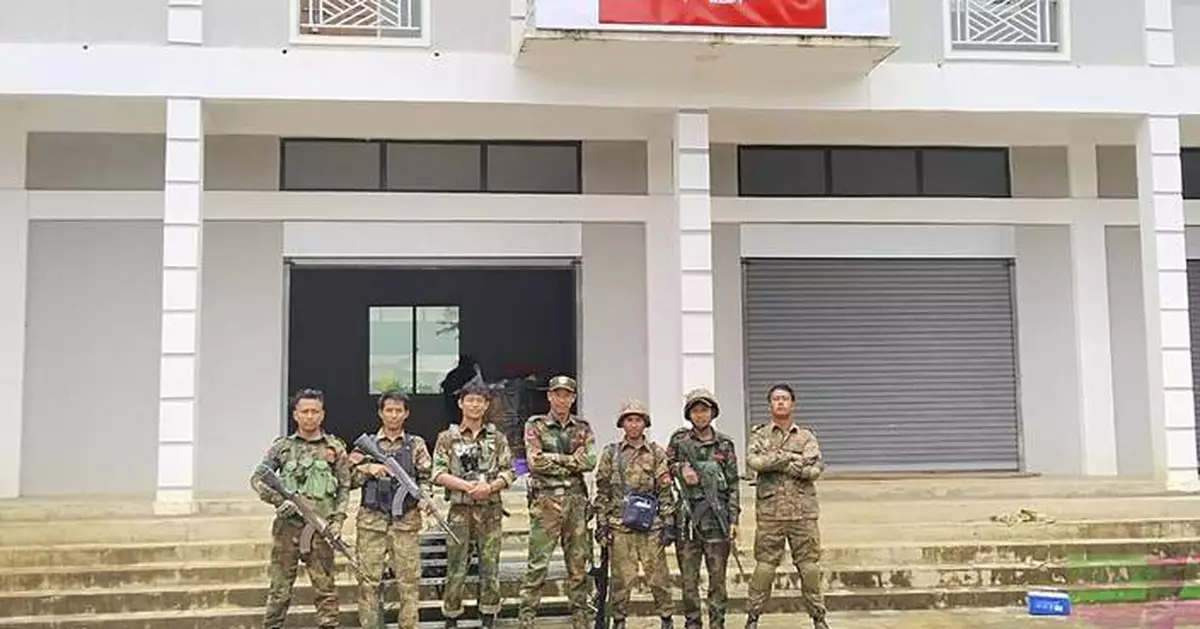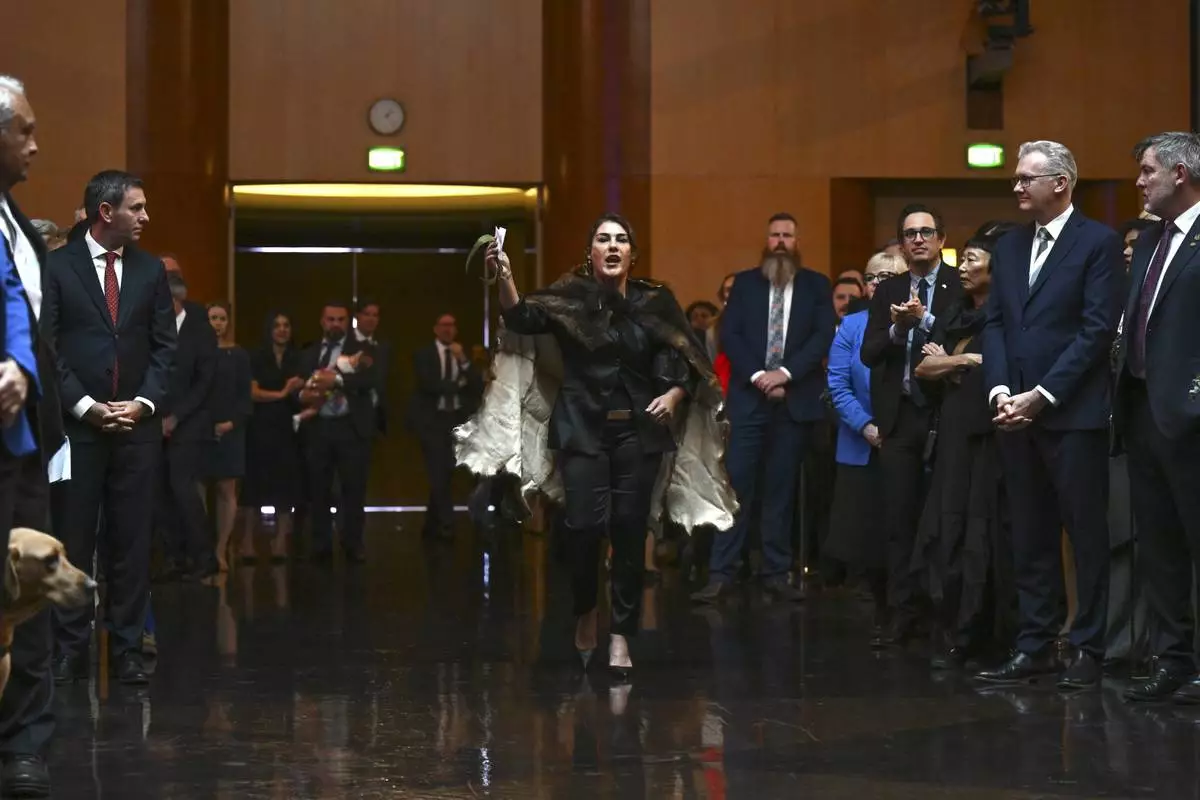BANGKOK (AP) — Three well-armed militias launched a surprise joint offensive in northeastern Myanmar a year ago, breaking a strategic stalemate with the regime's military with rapid gains of huge swaths of territory and inspiring others to attack around the country.
The military's control had seemed firmly ensconced with vast superiority in troops and firepower, plus material support from Russia and China. But today the government is increasingly on the back foot, with the loss of dozens of outposts, bases and strategic cities that even its leaders concede would be challenging to take back.
“The military is on the defensive all over the country, and every time it puts its energy into one part of the country, it basically has to shift troops and then is vulnerable in other parts,” said Connor Macdonald of the Special Advisory Council for Myanmar advocacy group.
“To us it doesn't look like there's any viable route back for the military to recapture any of the territory that it's lost.”
The military seized power from the elected government of Aung San Suu Kyi in February 2021, triggering intensified fighting with long-established armed militias organized by Myanmar's ethnic minority groups in its border regions, which have struggled for decades for more autonomy.
The army's takeover also sparked the formation of pro-democracy militias known as People's Defense Forces. They support the opposition National Unity Government, which was established by elected lawmakers barred from taking their seats after the army takeover.
But until the launch of Operation 1027, eponymously named for its Oct. 27 start, the military, known as the Tatmadaw, had largely been able to prevent major losses around the country.
Operation 1027 brought coordinated attacks from three of the most powerful ethnic armed groups, known as the Three Brotherhood Alliance: the Myanmar National Democratic Alliance Army, the Arakan Army and the Ta’ang National Liberation Army. The alliance quickly captured towns and overran military bases and outposts along the Chinese border in northeastern Shan state.
Two weeks later, the Arakan Army launched attacks in its western home state of Rakhine, and since then other militia groups and PDFs have joined in around the country.
A year after the offensive began, resistance forces now fully or partially control a vast horseshoe of territory. It starts in Rakhine state in the west, runs across the north and then heads south into Kayah and Kayin states along the Thai border. The Tatmadaw has pulled back toward central Myanmar, around the capital Naypyidaw and largest city of Yangon.
“I never thought our goals would be achieved so quickly,” Lway Yay Oo, spokesperson for the Ta’ang National Liberation Army, told The Associated Press. “We only thought that we would attack the military council together to the extent we could, but it has been easier than expected so we’ve been able to conquer more quickly.”
Along the way, the Tatmadaw has suffered some humiliating defeats, including the loss of the city of Laukkai in an assault in which the Myanmar National Democratic Alliance Army captured more than 2,000 troops, including six generals; and of the city of Lashio, which had been home to the military's Northeast Command.
“The 1027 offensive was a highly impressive operation, quite complex, and the use of drones played a big role because basically they were able to dismantle the military's network of fire-support bases across northern Shan,” said Morgan Michaels, a Singapore-based analyst with the International Institute of Strategic Studies who runs its Myanmar Conflict Map project.
“And then, once the military's artillery support eroded, they were able to overrun harder targets like towns and battalion headquarters.”
A year later, the military is “substantially weakened,” he said, but it's too early to write it off.
The Tatmadaw has managed to claw back the town of Kawlin in the Sagaing region, which had fallen in the first days of the 1027 offensive, stave off an attack by three ethnic Karenni militias on Loikaw, the capital of Kayah state, and has retained administrative control of Myawaddy, a key border crossing with Thailand, after holding off an assault by one ethnic group with the assistance of a rival militia.
Many expect the military to launch a counteroffensive when the rainy season soon comes to an end, bolstered by some 30,000 new troops since activating conscription in February and its complete air superiority.
But at the same time, resistance groups are closing in on Mandalay, Myanmar's second largest city, in the center of the country.
And where they might be out-gunned, they have gained strength, hard-won experience and confidence over the last year, said the Ta’ang National Liberation Army's Lway Yay Oo.
“We have military experience on our side, and based on this experience we can reinforce the fighting operation,” she said.
Thet Swe, a spokesperson for the military regime, conceded it will be a challenge for the Tatmadaw to dislodge the Three Brotherhood Alliance from the territory it has gained.
“We cannot take it back during one year,” he told the AP in an e-mailed answer to questions. “However, I hope that I will give you a joyful message ... in (the) coming two or three years.”
As the military has faced setbacks in the fighting on the ground, it has been increasingly relying on indiscriminate air and artillery strikes, resulting in a 95% increase in civilian deaths from airstrikes and a 170% increase in civilians killed by artillery since the 1027 offensive began, according to a report last month by the United Nations' Office of the High Commissioner for Human Rights.
The Tatmadaw has been accused of deliberately targeting civilians whom it believes support the resistance militias, a tactic that is only turning more against them, said Isabel Todd, coordinator for the SAC-M group.
“It doesn't seem to be having the effect that they want it to have,” she said. “It’s making them even more hated by the population and really strengthening the resolve to ensure that this is the end of the Myanmar military as it’s known.”
Military spokesperson Thet Swe denied targeting civilians, saying it was militia groups that were responsible for killing civilians and burning villages.
Hundreds of thousands of civilians have been displaced by the fighting, and there are now more than 3 million internally displaced people in Myanmar overall, and some 18.6 million people in need, according to the U.N.
At the same time, the 2024 humanitarian response plan is only 1/3 funded, hindering the delivery of aid, said Sajjad Mohammad Sajid, head of the U.N. Office for the Coordination of Humanitarian Affairs operation in Myanmar.
“The humanitarian outlook for the next year is grim, and we anticipate that the deteriorating situation will have a massive impact on the protection of civilians," he said in an interview.
In some areas, however, the offensive has eased pressure, like northwestern Chin state, which borders Bangladesh and India and had previously been the focus of many of the Tatmadaw's operations, said Salai Htet Ni, a spokesperson for the Chin National Front whose armed wing has been involved in fighting the military.
“In October of last year the military convoys that were going up into the Chin mountains were withdrawn,” he said. “As a result of the 1027 operation there have been almost no major military activities.”
As the front has expanded it has seen militias advancing out of their own ethnic areas, like when Rakhine-based Arakan Army in January seized the Chin town of Paletwa, which has given rise to some friction between groups, foreshadowing possible future strife should the Tatmadaw eventually fall.
In the case of Paletwa, Salai Htet Ni said his group was happy that the AA took it from the Tatmadaw, but added that there should have been negotiations before they began operating in Chin territory and that the AA should now bring Chin forces in to help administer the area.
“Negotiations are mandatory for these regional administration issues,” he said. “But we will negotiate this case through dialogue, not military means.”
At the moment there is a degree of solidarity between the different ethnic groups as they focus on a common enemy, but Aung Thu Nyein, director of communications for the Institute for Strategy and Policy-Myanmar think tank said that does not translate to common aspirations.
Should the Tatmadaw fall, it could lead to the fragmentation of Myanmar unless the groups work hard to resolve political and territorial differences.
“As far as I see, there is no established mechanism to resolve the issues,” he said. “The resistance being able to bring down the junta is unlikely, but I cannot discount this scenario, (and) if we cannot build trust and common goals, it could lead to the scenario of Syria.”
Complicating the political picture is the influence of neighboring China, which is believed to have tacitly supported the 1027 offensive in what turned out to be a successful bid to largely shut down organized crime activities that had been flourishing along its border.
In January, Beijing used its close ties with both the Tatmadaw and the Three Brotherhood groups to negotiate a ceasefire in northern Shan, which lasted for five months until the ethnic alliance opened phase two of the 1027 offensive in June, accusing the military of violating the ceasefire.
China has been displeased with the development, shutting down border crossings, cutting electricity to Myanmar towns and taking other measures in a thus-far unsuccessful attempt to end the fighting.
Its support for the regime also seems to be growing, with China's envoy to Myanmar urging the powerful United Wa State Army, which wasn't involved in the 1027 offensive or related fighting, to actively pressure the Myanmar National Democratic Alliance Army and Ta’ang National Liberation Army to halt the renewed offensive, according to leaked details of an August meeting widely reported by local media.
There is no evidence that the UWSA has done that, however.
“The idea that the northern groups and the Three Brotherhood Alliance etc. are somehow just agents of China is a complete misconception,” Todd said.
“They have their own objectives which they are pursuing that are independent of what China may or may not want them to do, and that's apparent in the incredible amount of pressure that China has put on them recently.”
Because of the grassroot support for the resistance, it is less vulnerable to outside influence, said Kyaw Zaw, a spokesperson for the opposition National Unity Government.
“No matter who is putting pressure on us, we are winning because of the power of the people,” he said.

In this photo provided by Mandalay People's Defence Force, its members pose for a photograph in front of the gate of the captured army battalion in Mogok township in Mandalay region, Myanmar, on July 25, 2024. (Mandalay People's Defence Force via AP)

In this photo provided by Mandalay People's Defence, members of the Ta'ang National Liberation Army, one of the ethnic armed forces in the Brotherhood Alliance, and Mandalay People's Defence Force pose for a photograph in front of the captured building of the Myanmar's War Veterans' Organisation in Nawnghkio township in Shan state, Myanmar, on June 26, 2024. (Mandalay People's Defence Force via AP)











